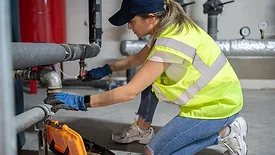Home » Keywords: » workforce development
Items Tagged with 'workforce development'
ARTICLES
Editorial Opinion | Kristen Bayles
A personal look at the lessons today’s plumbing apprentices teach us about skill, pride, and opportunity.
Read More
Guest Editorial | Phil Hotarek
Recruit character, teach skill
How everyday interactions can reveal candidates with the heart, grit and service mindset the trades desperately need.
December 11, 2025
And So It Flows Podcast
Podcast: All hands on deck: Technical training for the next generation of pros
December 9, 2025
Guest Editorial | Dona Thompson
For an effective apprenticeship program, it’s critical to invest in tech
Three tips for successful implementation of a tech-friendly apprenticeship program.
September 29, 2025
Breaking barriers: UA Local 9’s Committee leads the way in recruitment, mentorship and support
From schools to job sites, the union’s women-led initiative is challenging outdated stereotypes and proving that women belong in the trades.
September 24, 2025
Oatey Co. named top workplace in Northeast Ohio for 15th time
This award was presented by NorthCoast 99.
September 22, 2025
The Blue Collar Coach | Kenny Chapman
Coaching vs. managing: The modern leader’s approach
August 28, 2025
Editorial Opinion | Kristen Bayles
More than a paycheck: why retention starts with respect
Respect and trust are the real reasons workers stay in this industry.
August 18, 2025
Guest Editorial | Lindsay Renkel
Work smarter, not harder: giving labor productivity a boost with technology
Facing a growing labor gap, plumbing and mechanical contractors are turning to digital tools.
July 14, 2025
Guest Editorial | Phil Hotarek
Connecting with gen Z – why they’re the plumbing trade’s next big thing
Why you should be recruiting gen Z, and how to do it.
June 18, 2025
Keep your content unclogged with our newsletters!
Stay in the know on the latest plumbing & piping industry trends.
JOIN TODAY!Copyright ©2026. All Rights Reserved BNP Media.
Design, CMS, Hosting & Web Development :: ePublishing
















